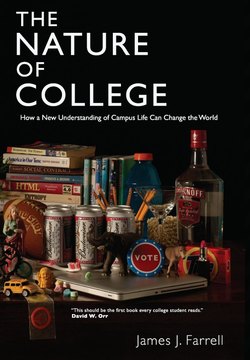Читать книгу The Nature of College - James J. Farrell - Страница 13
На сайте Литреса книга снята с продажи.
6) Words and Worlds
ОглавлениеWords structure our worlds. When we talk about a “good job” instead of “good work,” for example, it changes the nature of the conversation and sometimes it changes nature itself. Words like “profit,” “progress,” “success,” “cheap,” and “cool”—words we don’t even think of as environmental—have a lot to do with the way we treat the natural world. Paying attention, then, to how we talk about our lives, how rhetoric and persuasion work, gives us the opportunity both to understand the worlds we create through our words and how to tell the truth so that people listen. Looking deeply at language also invites us to think about new words and hybrids because, as Michael Pollan says, “names have a way of making visible [the] things we don’t easily see.”6
One such word is “ecologician,” connecting ecological perspectives with the magic that can happen once we see our world clearly. And scattered throughout the text are entries from an ecologician’s dictionary, defining words so that they make visible the real complexities in the moral ecology of our everyday lives.7
Ecologician: 1) A student of ecology, including the moral ecology of everyday life; 2) a person who practices the magical arts of regenerative design.
Wor(l)dplay: The art of using words to challenge worldviews and change the world.
The essay is a standard literary form, a useful way of arranging words to make meaning. In college, the most common kind of essay is the expository essay, a persuasive argument supported by reason and evidence. This book has many features of the expository essay—ideas, evidence, facts, endnotes—but it’s ultimately exploratory. The expository essay tries to prove all of its contentions, while the exploratory essay prefers to probe connections. Exploring links between personal life, cultural patterns, and the natural world, this essay leaves space for readers to reflect on their own experience, and invites them into a conversation about the meanings of college, and the personal and institutional possibilities of a culture of permanence.
Words structure our worlds but they can also change the world. In Teaching as a Subversive Activity, Neil Postman and Charles Weingartner suggest, “We act on the basis of what we see. If we see things one way, we act accordingly. If we see them in another, we act differently. The ability to learn turns out to be a function of the extent to which one is capable of perception change. If a student goes through four years of school and comes out ‘seeing’ things in the way he did when he started, he will act the same. Which means he learned nothing. If he does not act the same, it means he changed his way of talking. It’s as complicated as that.” With any luck, the words in this book will help to change ways of seeing, ways of talking, and ways of acting.8
